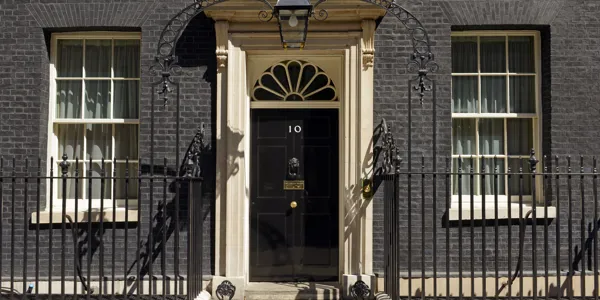Can investors gain trust in Truss?
As expected, Liz Truss is the choice of the Conservative membership and takes residence in 10 Downing Street with immediate effect. The question now is whether she will follow through on the promises she made in her campaign, or whether the realities of government will bite.

Truss inherits a difficult legacy. Inflation is at highs not seen since the 1970s, with households under strain from soaring energy bills. The UK economy has an entrenched problem of low growth and productivity. The UK’s separation from the EU is not fully resolved. Public sector strikes are likely to dominate the coming winter.
Tax cuts
Truss’s headline policy has been around tax cuts, which she has billed as the way to head off looming recession. Following the Bank of England’s gloomy prediction of recession, she said: “It is, of course, extremely worrying. But it is not inevitable. We can change the outcome, and we can make it more likely that the economy grows.”[1]
With that in mind, she has said she would reverse the recent rise in National Insurance and scrap the upcoming increase in corporation tax. While her critics have said this will cost money, do little to ease the pain for the poorest households and potentially stoke inflation, Truss says the cuts will generate growth and pay for themselves. It is worth noting that corporation tax receipts have risen as the rate has been cut, but this may be more difficult to achieve as growth slows. [2][3]
Truss has also said she will consider a 5% cut in VAT[4], calling this a ‘nuclear’ option to ease the cost-of-living crisis. The Institute for Fiscal Studies says this will cost around £3.2 billion per month, but would save households around £1,300 per year.
Energy crisis
Truss backtracked on her early warning against ‘handouts’ and both candidates appeared to recognise the problems posed for households by high energy bills. Truss has promised “immediate support to ensure people are not facing unaffordable fuel bills.”[5] However, the details of that support are still sketchy. Current Chancellor Nadhim Zahawi has said he has prepared a range of options for the incoming Prime Minister, including support for small businesses.
In the longer term, Truss has said that her priority is to cut green levies on energy bills. The sums involved are negligible – they cost households around £150 per year.[6] However, as a symbolic move away from renewable energy funding, this would be important. Truss has said she will expand North Sea gas supplies and allow fracking.
Foreign policy
Any hope that an incoming prime minister would adopt a more conciliatory line to improve the UK’s relationship with its European trading partners has proved wishful thinking. Truss has promised a tough line on all foreign powers from Brussels to Russia to Beijing.
She supports the rewriting of the Northern Ireland protocol and promised a bonfire of EU legislation. The worst outcome would be that this antagonises the UK’s European neighbours into a trade war, putting pressure on the UK’s already fragile economy.
Institutions
A final theme to Truss’s premiership is a challenge to economic orthodoxy. She has accused the Treasury of focusing on “abacus economics of making sure that tax and spend add up but not focusing enough on economic growth.”[7]
She has also suggested that she will review the inflation mandate of the Bank of England, which last happened in 2013. The independence of the Bank of England has created significant stability in monetary policy and any attempt to change that could be disruptive. The impact has already been felt in the UK currency and gilt market.
Investment considerations
For investors, there are questions: will Truss gives investors’ confidence and restore faith in UK assets? She will need to build confidence in the UK both domestically and globally for the UK economy to perform and attract international investors. She will need to do this against a backdrop of high energy prices and slowing global growth.
The majority of the larger firms listed in London derive their earnings and revenues overseas – and some will benefit from higher energy prices. The strength or weakness of her premiership is likely to be felt most in sterling, plus domestically focused small and mid-cap equities. UK assets remain cheap, but there is a hill to climb to change the prevailing view on the UK’s outlook.
Truss will know she is on the clock. She has less than two years to the next election and some significant challenges to resolve. The domestic UK economy faces a lot of headwinds. She may also have to deal with a restless party, for whom she was not the first choice. It is an unenviable in-tray.
Sources:
[1] Truss says UK recession not inevitable Sunak says lights flashing red, Morningstar, 5 August 2022
[2] United Kingdom Corporate Tax Rate, Tradingeconomics.com [Accessed 2 September 2022]
[3] HMRC tax receipts and National Insurance contributions for the UK (Annual Bulletin), GOV.uk [Accessed 2 September 2022]
[4] UK's Liz Truss considers 5% cut in VAT if she becomes PM -Telegraph, Reuters.com, 28 August 2022
[5] UK's Liz Truss vows "robust" energy bill support for households, Reuters.com 1 September 2022
[6] Tory leadership: Liz Truss pledges to ditch corporation tax hike and pause Green Levy in first hustings, iNews.co.uk, 15 July 2022
[7] Truss wants to make No 10 ‘economic nerve centre’ if she becomes PM, Financial Times, 14 August 2022
Important information
By necessity, this briefing can only provide a short overview and it is essential to seek professional advice before applying the contents of this article. This briefing does not constitute advice nor a recommendation relating to the acquisition or disposal of investments. Details correct at time of writing.
The value of an investment may go down as well as up and you may get back less than you originally invested.




